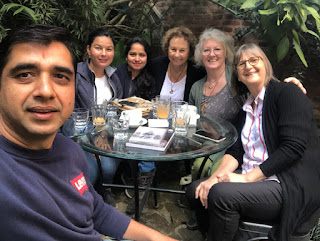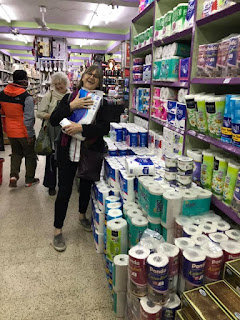So here we are, the last day of our Nepal trip. Qatar Airport is still open to Nepali transfers, at least, and Heathrow will let us get home. 24 hours and we’ll be on that flight. We’ll have a whistle stop time in Doha, with no time to mingle with bugs. The flight IS a worry, but the three of us have been pretty cautious during our time here, and that’s not going to change on our flight. I’ve checked in with home. My mother is self isolating, has a bucket and wipes inside and outside of her flat in the old people’s sheltered housing. She’s on 24hr oxygen and incredibly vulnerable. My father lives alone in the village and the allotment is his friend. As much as we try, he’ll do just as he sees fit, but is a bit less vulnerable. I’ll not be visiting either until I know I’m safe to.
Here, there’s still very little going on with cases of
Covid-19. It’s been mentioned there may be as little as 300 tests in the whole
country, so until cases start hitting the hospitals, maybe Nepal won’t really know
how it’s spreading.
 |
| Dr Prasad with 'Call the Midwife' DVD set. |
Rather than sharing midwifery in the bigger workshops, I’ve
been able to sit at my laptop and write a couple of reports. The new midwives
now have the evidence (limited as it is) to support use of TENS for labouring
women, and potentially early labourers. There are now a few TENS machines int
eh hospitals here, but I believe it is only Tribhuvan Teaching hospital, Mangla
Devi Birth Centre that is using them on a regular basis. While there is NO pain
relief, here, for labouring women, TENS offers women at least a coping
‘distraction’, and gives the very busy midwife an extra tool to support that
woman. The reports have been shared with the doctors as well as the midwives,
because without the doctors support for this machine, it’ll not be ‘allowed’ in
the birth room.
During discussion yesterday, the availability of props in
the birth room was brought up and, again, we explored getting some wooden birth
stools made up. I managed to find a few model examples, get a few common
dimensions, consider the sanitary requirements, and storage under the rigid
metal beds. This report has gone to the midwives and doctors, too. Maybe they
will investigate getting a couple of models made up, and see how they go.
Plastic birth stools aren’t available here, and the Cub blow up stool is far
too expensive to have flown here to have it pop on a rough concrete floor. I
did request the gift of a Cub stool, or a heavily reduced cost, before i left
for Nepal, but I heard nothing back.
We had the most blissful meeting of minds yesterday, over
coffee in the charming ‘Of Silk and Salt’ guest house in Patan. We brought Dr
Shree Prasad, chief consultant obstetrician and gyneacologist at Paropakar women's hospital, together with a couple of the new midwives, Prasansa, and Bedika.
It was a very informal gathering, and we were able to hand books over to the
midwives to share and circulate between them all. We gave Dr Prasad equipment
for the Women’s hospital, along with some text books to remain at the midwife’s
station in the labour ward. We thought he’d like a ‘Birth in Focus book’, and
even a CD set of ‘Call the Midwife’. Dr Prasad is definitely a communicator,
and empathetic leader. The potential for him to bring wonderful changes to the
new and already changing birth centre, is great.
 |
| Prasansa, midwife in full Nepal discussion with Dr Prasad. |
 |
| Our Covid-19 mindful gifts from the midwives. Thank you! |
We chatted about the busy antenatal wards on the hospital.
Two wards of twenty women, and just two nurse-midwives. Ward rounds of doctors
performing routine vaginal examinations with without thought for privacy or
respect for the women. Too many women admitted for the amount of nursing
support. The question remains how many women actually need to be there. Some
are early labourers who are not sent home, due to distance. These could be
given a ‘rest room’ to stay in while establishing their labour.
It’s good to ask questions. There may not be answers, but if
there are problems, they need to be addressed. We all try to do the best with
what we have, but fresh eyes are sometimes needed to see the wood for the
trees.
 A third day of no hot water. I pushed Sarah into the cold
shower this morning. She woke everyone up with her gasps. The sun is already
shining outside, so we should have some warm water at least tonight. We’re
getting on with it. How can we not, when just below our window there are locals
collecting their water from a well.
A third day of no hot water. I pushed Sarah into the cold
shower this morning. She woke everyone up with her gasps. The sun is already
shining outside, so we should have some warm water at least tonight. We’re
getting on with it. How can we not, when just below our window there are locals
collecting their water from a well.





























